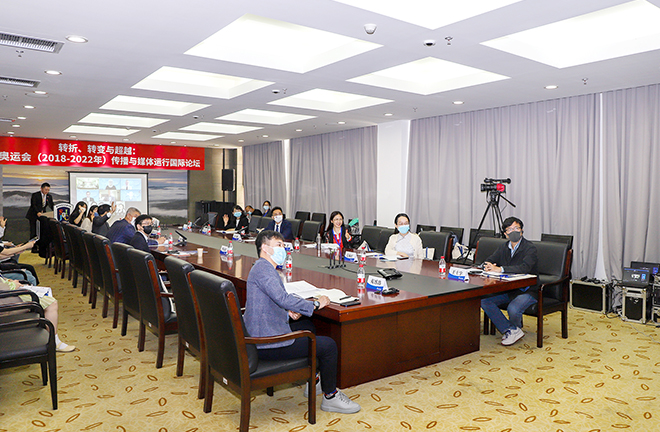Int’l scholars explore Olympic reporting

The International Forum on Olympic Communication and Media Operation in East Asia (2018–2022) in Beijing on April 23 Photo: BFSU
International scholars exchanged ideas on how the new media landscape is changing Olympic communication at a forum in Beijing on April 23.
The International Forum on Olympic Communication and Media Operation in East Asia (2018–2022), hosted by Beijing Foreign Studies University, focused on case studies of media reports from the PyeongChang 2018 Winter Olympics, the Tokyo 2022 Summer Olympics, and the Beijing 2022 Winter Olympics.
Amid fallout from the COVID-19 pandemic, the number of reporters who came to Beijing to report on the Winter Olympics decreased, but their coverage became wider. In this regard, Xu Jicheng, director general of the Media Operations Department of the Beijing 2022 organizing committee, said that the use of new technologies has changed reporting forms. Cloud reporting and virtual presence allowed fewer reporters to produce more Olympic reports.
“This should be used as an opportunity to strengthen the sharing of research among domestic and foreign media—and academic colleagues,” Xu said.
David Rowe, emeritus professor of the Institute for Culture and Society at Western Sydney University, conducted an in-depth analysis of the different media positions in different countries and regions in reporting the three Olympic Games held in East Asia, as well as various methods for creating narratives, revealing the vulnerability of media narrative strategies and agenda-setting capabilities under the influence of geopolitical tensions, sudden crises, and other factors. He believes that online media has changed the normal practice of sports reporting.
Xue Wenting, deputy dean of the School of Journalism and Communication at Beijing Sport University, and her team analyzed how the 2022 Beijing Winter Olympics were reported by mainstream media in China and the West, and summarized the media agenda of three newspapers: China Daily, New York Times, and The Times, on the 2022 Beijing Winter Olympics. When media from different countries report the same international event, they often form different media agenda networks, which in turn affects the public’s perception and attitude towards the event.
Andrew Billings, executive director of the Alabama Program in Sports Communication at the University of Alabama in the US, proposed a research paradigm to examine the influence of the Winter Olympics, taking the 2022 Beijing Winter Olympics as an example. After a detailed comparison of the media viewing habits of audiences in different countries, as they watched the Olympic Games, he proposed that in the new media era, various information receiving terminals make audiences receive information in a variety of ways, which is an important factor in studying the influence of the Winter Olympics.
Simon Licen, an associate professor from the Department of Educational Leadership and Sport Management at Washington State University in the US, proposed from the perspective of international social media that social media content aimed at Western audiences pays more attention to triggering audience interactions through quizzes. In comparison, Chinese social media platforms pay more attention to reporting facts, as well as the progress of construction of infrastructure and transport facilities. Therefore, global communication of sports events needs to consider cultural differences, and communication methods should be determined according to the needs of the audience: the promotion of media content should be customized and differentiated.
Market differences affect users’ media consumption, said Bo Li, an assistant professor of Sport Leadership and Management at Miami University in the US. TV is no longer the only channel for watching Olympic events. New media is very important for Olympic coverage, giving people more choices as they watch events.
However, based on an analysis of media usage behavior of Generation Z [born after 1995] in Germany during the 2020 Tokyo Summer Olympics, and the 2022 Beijing Winter Olympics, Thomas Horky, a professor from the Macromedia University of Applied Sciences, and Christof Seeger, a professor at the Stuttgart Media University in Germany, said that television broadcasts still have a huge impact on the dissemination of the Olympic Games in Germany, followed by social media.
Edited by JIANG HONG
